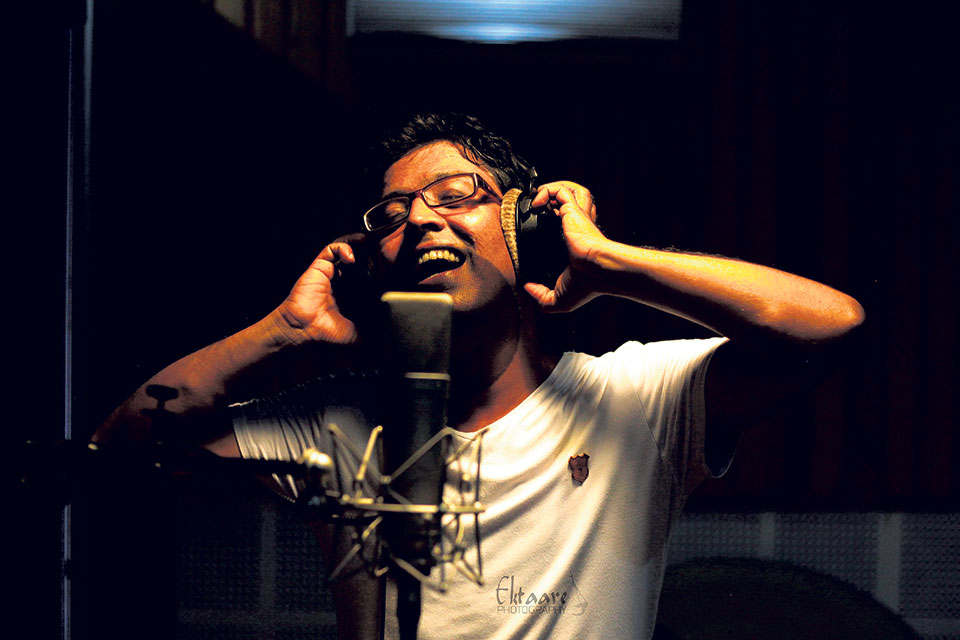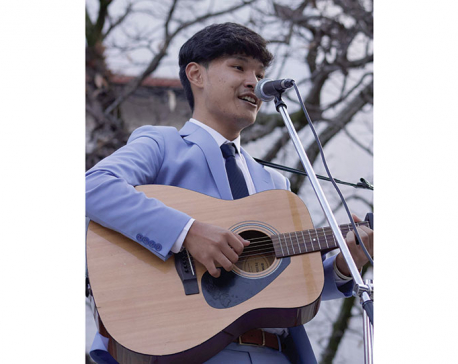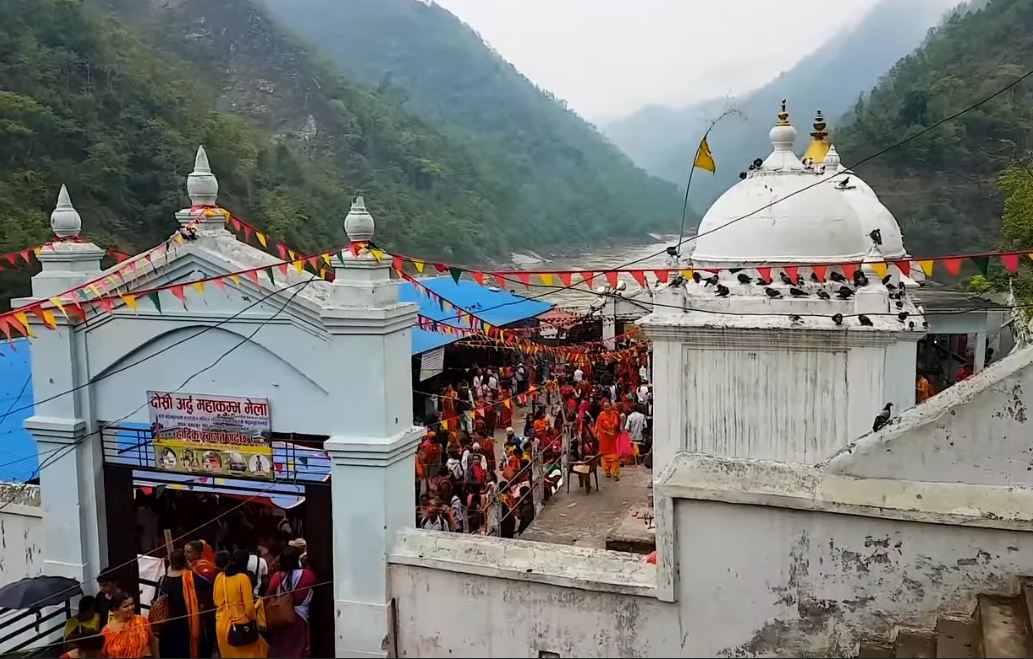
OR

As a young boy he watched in amazement as musicians performed on stage. It was an image that carved a permanent space in his heart and mind and made him want to become a musician himself. And that drive coupled with his love for music made Sanup Paudel go on to create a name for himself in the Nepali music industry.
Today, Paudel has won numerous awards and accolades for his songs “Daiba Hey” from the movie Manjari, “Pratispardha – A Struggle Within”, “Timro Desai Ma” among many other unforgettable tunes.
As a self-confessed nature lover and teacher of music, Paudel believes music is a great medium of communication and finds it as soothing as nature. From releasing Hindi compositions to coaching participants for The Voice of Nepal, Paudel is steadily gaining a good foothold in the music industry and how.
The Week’s Rakshya Khadka caught up with the versatile and humble melody maker to know more about his musical journey.
What was it about music that drew you in?
You could say I grew up with music. My mother was always chanting verses from the Gita and my father used to bring cassettes of western music every time he came home from his long travels and my siblings were, more often than not, tuned into some radio station playing music. Music was an unavoidable part of my childhood. Also, I grew up in the Northeast of India (in Shillong) where music was in every nook and cranny. Radio Ceylon broadcasted ‘Binaca Geetmala’ that was a weekly countdown show of Bollywood songs, and Radio Nepal had wonderful jingles on air and there was this introductory soundtrack for Radio Nepal that had a queer vibration, so very unique and distinct that captured the very essence of Nepal. So you could say music always had me enraptured.
Your thoughts on the younger/current generation of musicians?
They are nothing short of phenomenal. I see a horde of young artists bringing in such diversity that our country has never seen before. Anupam Sharma, Night, among others are some artists that have made good attempts at exploring genres and music styles that were foreign concepts in the Nepali music industry. Their efforts are laudable, although I have to admit that things have become easier these days what with the internet and home studio productions. Back in the day, artists had to slog to get a song recorded. It isn’t so these days. Anyone with the passion can have his/her music out for the world to listen to but I hope that doesn’t mean musicians should compromise on the ethics while recording. They should always record in good studios and escape low-budgeted recording. That is the only way to come up with quality music.
Music has its own reach, its own appeal. What would you want people to feel when listening to your music?
Frankly, even at this stage of my career, I’m still uncertain. To want people to feel a certain way about my work, to want to persuade them feels wrong to me. The only thing I’ve ever hoped for is for people to appreciate good music. It doesn’t have to be my music but good music in general. But the distinction between what is good and what is bad appears to be blurring. It isn’t a binary decoding so its judgment is rather subjective. I only want people to be able to understand music. Distinguish the ones that are for healing, for lamenting, or for sharing happiness. I only wish for awareness and nothing more.
How do you think one can become a good artist?
It takes time to become a good artist. It requires patience and infinite dedication. Understanding the essence of music and mastering the technicalities aren’t all that there is to being a musician. Once you create something you have to keep improving and improvising. Anyone who calls themselves a ‘”complete” musician is a fool. There’s no sugarcoating it. A musician has to inspire himself every day, every time. He has to take inspiration from all that is around him and try to see what he can become. Also, I believe artists should never personalize their art. Music has its own grace and when you inject yourself into it, it erodes its essence. So this separation of self from the art is very important. It’s the very nature of music itself and not a personal belonging. Music has to be seen as it is and not as one wishes to see it.
As a coach in The Voice of Nepal you must have come across exceptional talents. How has this experience impacted you?
The experience I have had as a coach has been life transforming. We had to listen to some 108 talents and what delighted me no end was that every single one of them was driven by passion and not just an ephemeral obsession. I’m a very passionate person myself and these 20 something kids have further fueled it. They were a bunch of talented people. We had Gandharva singers, Raga singers, and singers who would belt out timeless old classics with such ease that your jaws would drop. I had always believed that the current generation was deviating from the courses carved by senior musicians. They proved me wrong. And they had such clarity in identifying good music. It was astonishing.
What advice would you give to a young musician with a guitar strapped on his back, and no inkling of how to follow his passion?
Go where your heart takes you. It would be a crime not to do so. But to survive as an artist, each day has to be lived with the same passion, with the same state of mind. You can’t waver and you can’t lose hope. Music inspires change. You can see it in the way Jean Sibelius influenced the whole Finnish population with the music he created. His work was national but also universal, generic but also intimate. If you have it in you to inspire and become inspired and if you can keep at it long past your youth then do it. Don’t hesitate and don’t let anything or anyone stop you.
Your aspirations for the future?
For a very long time I have wanted to work with good musicians. Raju Singh, an exceptional music director, gave me my first break. Ever since I first got my paycheck recording a song I have wanted to broaden my musical reach, and learn and explore more. After a good number of years I have come to a point where I get to work with exceptional musicians, and I’m especially looking forward to working with Samyog Regmi (most notably a jazz guitarist) who, I think, is a brilliant musician. With further collaborations and experiences, I wish to introduce more good sounds in the Nepali music industry.
You May Like This

A Young Musician on the rise
From tailing his two elder brothers when they listened to John Mayer albums when he was young to releasing his... Read More...

Music and more music
He began his musical career in 1997 when he sang “Jindagi ko k bharosa” in a music competition when he... Read More...

CG announces new music series show
KATHMANDU, Oct 7: Seasoned Nepali musicians Jems Pradhan, Nabin K Bhattarai, Sanjay Shrestha and Deepak Bajracharya will soon collaborate with fresh... Read More...





Just In
- NEPSE lost 53.16 points, while investors lost Rs 85 billion from shares trading last week
- Rainbow tourism int'l conference kicks off
- Over 200,000 devotees throng Maha Kumbha Mela at Barahakshetra
- Indians vote in the first phase of the world’s largest election as Modi seeks a third term
- Kushal Dixit selected for London Marathon
- Nepal faces Hong Kong today for ACC Emerging Teams Asia Cup
- 286 new industries registered in Nepal in first nine months of current FY, attracting Rs 165 billion investment
- UML's National Convention Representatives Council meeting today





_20220508065243.jpg)







Leave A Comment